完整版)人教版七年级英语下册第五单元知识点总结
七年级下册人教版u5知识点总结

七年级下册人教版u5知识点总结本文将为大家总结七年级下册人教版英语Unit 5的知识点,包括词汇、语法、听力和阅读等方面的内容。
希望本文能为大家学习英语提供帮助。
词汇1. 单词记忆和拼写Unit 5的词汇量较大,包括生词和短语共计80余个,其中部分单词拼写相对较难。
在学习时,需要重点掌握拼写和发音。
2. 词义记忆和运用在学习词汇的过程中,要注重理解单词的词义,并学会在语境中灵活运用。
可以通过做词汇练习、朗读语音练习和与他人对话等方式进行巩固和提高。
语法1. 简单过去时态在本单元中,我们主要学习了一般过去时态的构成和用法。
需要注意三种不规则动词的变化形式,并学会运用过去式来描述过去发生的事件。
2. 动词的ing形式在本单元中,我们学习了动词的ing形式。
需要注意动词加ing 后的变化和用法,学会运用动词的ing形式来描述正在进行的动作。
听力在本单元中,我们主要学习了听力技巧和相关的听力实践。
需要注意听力材料的节奏和语速,并积极参与说话和发表自己的意见。
阅读1. 阅读技巧在本单元中,我们学习了一些阅读技巧,例如识别关键信息、理解文章的主题和目的等。
需要积极训练自己的阅读能力,提高阅读速度和理解能力。
2. 阅读内容本单元中的阅读内容主要包括人物传记、日常生活和校园文化等方面。
需要注意通过阅读不同类型的文章来提高自己的阅读能力,并加强对不同文化背景的了解和理解。
结语本文为大家总结了七年级下册人教版英语Unit 5的知识点,包括词汇、语法、听力和阅读等方面的内容。
在学习时,需要注重词汇记忆、语法理解、听力训练和阅读理解,通过不断练习和提高来提升自己的英语水平。
七年级下册英语unit5知识点归纳人教版
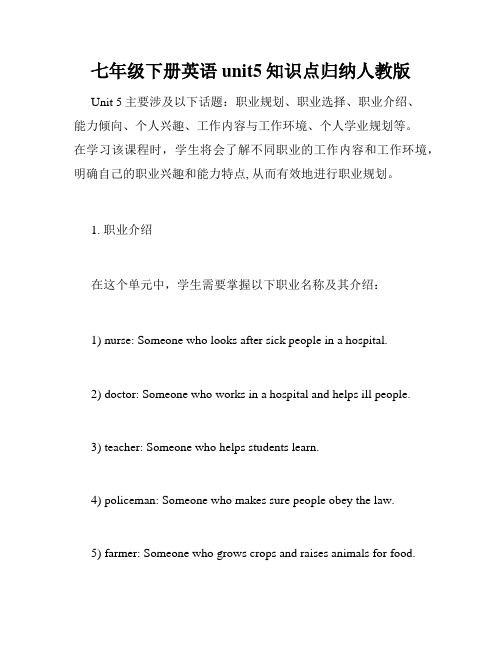
七年级下册英语unit5知识点归纳人教版Unit 5主要涉及以下话题:职业规划、职业选择、职业介绍、能力倾向、个人兴趣、工作内容与工作环境、个人学业规划等。
在学习该课程时,学生将会了解不同职业的工作内容和工作环境,明确自己的职业兴趣和能力特点, 从而有效地进行职业规划。
1. 职业介绍在这个单元中,学生需要掌握以下职业名称及其介绍:1) nurse: Someone who looks after sick people in a hospital.2) doctor: Someone who works in a hospital and helps ill people.3) teacher: Someone who helps students learn.4) policeman: Someone who makes sure people obey the law.5) farmer: Someone who grows crops and raises animals for food.通过学习和掌握这些职业名称及其介绍,学生能够更好地了解职业特征和工作内容,从而更好地规划未来的职业选择和发展路线。
2. 能力倾向和个人学习规划本单元还涉及到了能力倾向和个人学业规划的内容,学生需要了解以下几个方面:1) 能力倾向:对学生而言,了解自己的能力倾向和特点至关重要。
学生可以通过自我调查和测试了解自己的兴趣爱好、性格特点和优势劣势。
通过这些方式,学生可以更好地理解自己,寻找适合自己的职业和发展方向。
2) 个人学业规划:了解自己的兴趣和能力倾向,将对学生制定适合自己的学习规划有很大帮助。
学生可以开展面向未来的学习计划,根据自己的职业发展方向选择合适的课程和学科,以及有针对性地提高自己的能力。
3. 工作内容与工作环境本单元还涉及了工作内容与工作环境的问题,学生需要理解以下几个方面:1) 工作内容:学生需要了解各种职业的工作内容和责任,对比不同职业的优点和缺点,以便选择适合自己的职业。
人教版七年级英语下册Unit5知识点归纳

Unit5 Why do you like pandas?知识点归纳一、重点短语1. importance in Thailand 在泰国的重要性2. Let’s see…. first. 让我们先看...3. favorite animals 最喜欢的动物4. kind of interesting 有点有趣5. South Africa 南非6. be from =come from 来自7. be smart 聪明的8. walk on two legs 用两条腿走9. all day/all night 整天/整夜10. a good name for her 对于她是个好名字11. like …a lot 非常喜欢......12. black and white 黑白相间13. You’re right. 你是正确的。
14. one of +名词复数(......其中之一)15. our first flag 我们的第一面旗16. a symbol of good luck 好运的象征17. draw well 画得好18. forget to do 忘记做某事19. get/be lost 迷路20. places with food and water有食物和水的地方21. be in great danger 处于危险22. cut down 砍倒23. over = more than 超过/多于24 be made of... 由…制成25.Thai Elephant Day 大象二、用法归纳1. —Why…? 为什么……?—Because… 因为……2. let sb. do sth. 让某人做某事3. want to do sth. 想要做某事4. one of+名词复数……之一5. forget to do sth. 忘记要做某事6. forget doing sth. 忘记做过某事7. help sb. (to) do sth. 帮助某人做某事8. be friendly to sb. 对某人友好三、重点句子1. —Why do you like pandas? 你为什么喜欢熊猫?—Because they’re kind of interesting. 因为它们有点儿有趣。
(完整版)人教版七年级英语下册Unit5知识点讲解
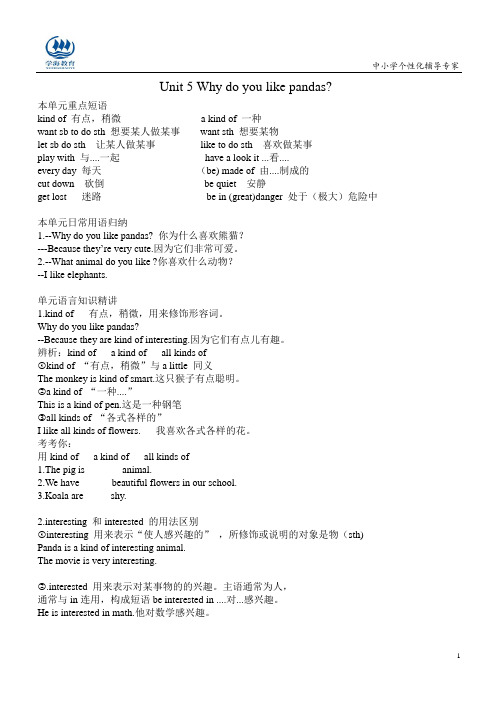
Unit 5 Why do you like pandas?本单元重点短语kind of 有点,稍微 a kind of 一种want sb to do sth 想要某人做某事want sth 想要某物let sb do sth 让某人做某事like to do sth 喜欢做某事play with 与....一起have a look it ...看....every day 每天(be) made of 由....制成的cut down 砍倒be quiet 安静get lost 迷路be in (great)danger 处于(极大)危险中本单元日常用语归纳1.--Why do you like pandas? 你为什么喜欢熊猫?---Because they’re very cute.因为它们非常可爱。
2.--What animal do you like ?你喜欢什么动物?--I like elephants.单元语言知识精讲1.kind of 有点,稍微,用来修饰形容词。
Why do you like pandas?--Because they are kind of interesting.因为它们有点儿有趣。
辨析:kind of a kind of all kinds of①kind of “有点,稍微”与a little 同义The monkey is kind of smart.这只猴子有点聪明。
②a kind of “一种....”This is a kind of pen.这是一种钢笔③all kinds of “各式各样的”I like all kinds of flowers. 我喜欢各式各样的花。
考考你:用kind of a kind of all kinds of1.The pig is _______animal.2.We have ______beautiful flowers in our school.3.Koala are _____shy.2.interesting 和interested 的用法区别①interesting 用来表示“使人感兴趣的”,所修饰或说明的对象是物(sth) Panda is a kind of interesting animal.The movie is very interesting.②.interested 用来表示对某事物的的兴趣。
七年级英语下册人教版unit5知识点归纳
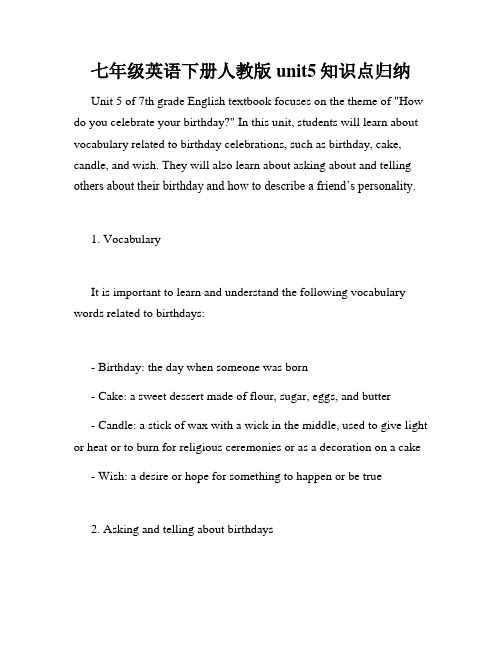
七年级英语下册人教版unit5知识点归纳Unit 5 of 7th grade English textbook focuses on the theme of "How do you celebrate your birthday?" In this unit, students will learn about vocabulary related to birthday celebrations, such as birthday, cake, candle, and wish. They will also learn about asking about and telling others about their birthday and how to describe a friend’s personality.1. VocabularyIt is important to learn and understand the following vocabulary words related to birthdays:- Birthday: the day when someone was born- Cake: a sweet dessert made of flour, sugar, eggs, and butter- Candle: a stick of wax with a wick in the middle, used to give light or heat or to burn for religious ceremonies or as a decoration on a cake- Wish: a desire or hope for something to happen or be true2. Asking and telling about birthdaysAsking and telling about birthdays is an important skill to learn to communicate with others about a significant event in their life. Here are some sentence patterns to help:- What's your birthday? My birthday is on ____________.- When is your birthday? My birthday is in _____________.- How old are you? I am ______________ years old.3. Describing a friend’s personalityIt can be fun and interesting to describe a friend’s personality. H ere are some adjectives that can be used to describe a person's personality:- Funny: someone who is able to make you laugh- Friendly: someone who is sociable and easy to talk to- Outgoing: someone who enjoys meeting new people and doing new things- Serious: someone who is focused and determined- Shy: someone who is nervous or uncomfortable in social situations- Sporty: someone who enjoys playing sports and being physically active- Talkative: someone who likes to talk a lot4. GrammarUnit 5 covers several grammatical structures that are important for 7th grade English learners:- Wh- questions: asking questions that include "who", "what", "when", "where", "why", and "how"- Personal pronouns: using pronouns to refer to people or objects in conversation, such as "I", "you", "he", "she", and "it"- Possessive adjectives: using adjectives to show ownership or possession, such as "my", "your", "his", "her", and "their"- Demonstrative pronouns: using pronouns to indicate specific objects or people, such as "this", "that", "these", and "those"5. Listening and speakingUnit 5 provides students with many opportunities to practice listening and speaking skills. Students can work in pairs or small groups to practice asking and answering questions about birthdays, describing their friends' personalities, and giving opinions on different birthday celebrations.In conclusion, Unit 5 of the 7th grade English textbook is an important unit that teaches students about vocabulary related to birthday celebrations, asking and telling about birthdays, describing a friend's personality, and key grammatical structures. By practicing these skills, students will be able to communicate better in English and have fun celebrating their birthdays with their friends.。
人教版七年级英语下册第五单元知识点汇总
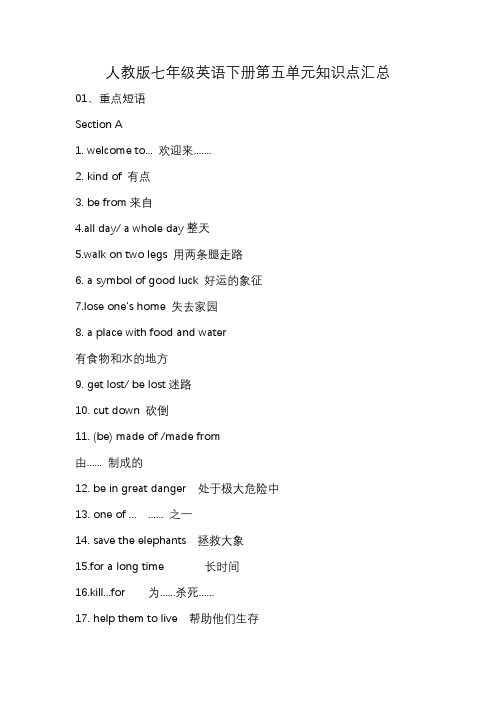
人教版七年级英语下册第五单元知识点汇总01、重点短语Section A1. welcome to... 欢迎来.......2. kind of 有点3. be from来自4.all day/ a whole day整天5.walk on two legs 用两条腿走路6. a symbol of good luck 好运的象征7.lose one’s home 失去家园8. a place with food and water有食物和水的地方9. get lost/ be lost迷路10. cut down 砍倒11. (be) made of /made from由...... 制成的12. be in great danger 处于极大危险中13. one of ... ...... 之一14. save the elephants 拯救大象15.for a long time 长时间16.kill...for 为......杀死......17. help them to live 帮助他们生存18.really scary很吓人19. South Africa 南非02、重点句子Grammar Focus 句子1. Why do you like pandas?你为什么喜欢熊猫?Because they’re kind of interesting.因为他们有点儿有趣2. Why does John like koalas?约翰为什么喜欢考拉?Because they’re very cute.因为它们非常可爱。
3. Why don’t you like tigers?你什么不喜欢老虎?Because they’re really scary.因为他们确实吓人。
4. Where are lions from?狮子来自哪里?They’re from South Africa.他们来自南非。
人教版七年级下册英语Unit5知识点

Unit5 名词:panda 熊猫zoo 动物园tiger 老虎elephant 大象lion 狮子giraffe 长颈鹿animal 动物kind 种类Australia 澳大利亚Africa 非洲pet 宠物leg 腿cat 猫flag 旗;旗帜place 地点;位置water 水danger 危险tree 树动词:save 救forget 忘记cut 砍;切kill 杀死形容词:cute 可爱的;机灵的lazy 懒散的;懒惰的smart 聪明的beautiful 美丽的;美好的friendly 友好的shy 害羞的;腼腆的介词:over 超过;多于;在……正上方兼类词:south adj 南方的;n 南;南方sleep v&n 睡觉down adv (坐、躺、倒)下; prep 向下;沿着短语:kind of 稍微;有点儿South Africa 南非get lost 迷路cut down 砍倒be in(great)danger 处于(极大)危险之中(be)made of 由……制成的知识点:1、 Let's do sth 让我们做某事吧! Let's = Let us Let's not do sth 让我们不要做某事!Let's go swimming!咱们去游泳吧!Let's play soccer!咱们去踢足球吧!Let's not tell him. 咱们不要告诉他。
Let's not play volleyball. 咱们不要打排球。
Let's go shopping!咱们去购物吧!答语:接受建议:Good idea./Sure./OK.不接受建议:Sorry, I……2、favorite adj. 最喜爱的;特别喜爱的n. 最喜欢的人或事物What's your favorite + 名词?=What + 名词 + do you like best?你最喜欢的……是什么?My favorite + 名词 + is/are……我最喜爱的……是……名词 + is/are my favorite. ……是我最喜爱的。
人教版七年级英语下册第五单元知识点总结
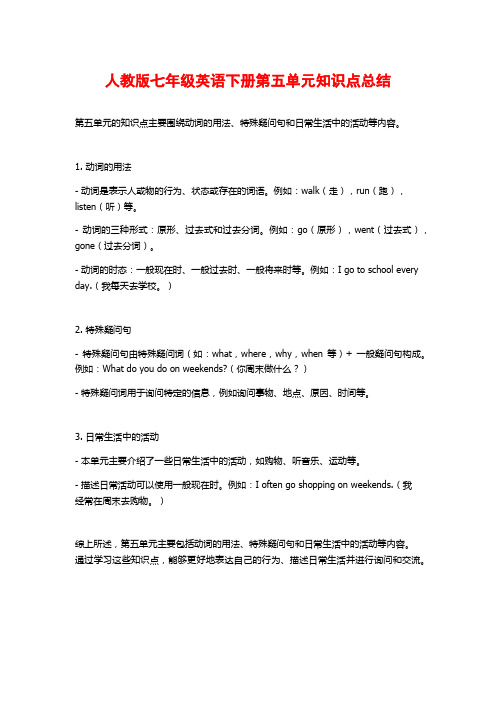
人教版七年级英语下册第五单元知识点总结
第五单元的知识点主要围绕动词的用法、特殊疑问句和日常生活中的活动等内容。
1. 动词的用法
- 动词是表示人或物的行为、状态或存在的词语。
例如:walk(走),run(跑),listen(听)等。
- 动词的三种形式:原形、过去式和过去分词。
例如:go(原形),went(过去式),gone(过去分词)。
- 动词的时态:一般现在时、一般过去时、一般将来时等。
例如:I go to school every day.(我每天去学校。
)
2. 特殊疑问句
- 特殊疑问句由特殊疑问词(如:what,where,why,when等)+ 一般疑问句构成。
例如:What do you do on weekends?(你周末做什么?)
- 特殊疑问词用于询问特定的信息,例如询问事物、地点、原因、时间等。
3. 日常生活中的活动
- 本单元主要介绍了一些日常生活中的活动,如购物、听音乐、运动等。
- 描述日常活动可以使用一般现在时。
例如:I often go shopping on weekends.(我
经常在周末去购物。
)
综上所述,第五单元主要包括动词的用法、特殊疑问句和日常生活中的活动等内容。
通过学习这些知识点,能够更好地表达自己的行为、描述日常生活并进行询问和交流。
七年级下人教版英语u5知识点

七年级下人教版英语u5知识点英语学习是中学生的必修课,七年级下册的第五单元是重要的学习内容,包括了语法、词汇和听力等多方面的知识点。
本文将围绕七年级下人教版英语U5知识点展开讲解,帮助学生更好地掌握这些知识点。
一、语法知识点1. 现在进行时现在进行时是指现在正在进行的动作。
构成方式是“be+现在分词”。
“be”根据主语的不同而变化,只在第三人称单数中为“is”。
例如:I am dancing. 我正在跳舞。
He is playing basketball. 他正在打篮球。
2. 一般现在时一般现在时是指现在经常性或普遍性的动作或状态。
构成方式是动词原形或第三人称单数形式。
例如:I like ice cream. 我喜欢冰淇淋。
My mother washes vegetables every day. 我妈妈每天洗蔬菜。
3. 过去式过去式是指已经发生了的动作或状态。
大多数动词的过去式是在词尾加-ed。
如果动词是以e结尾,只加d。
如果动词是以辅音字母+y结尾,变y为i再加ed。
例如:I played basketball yesterday. 我昨天打了篮球。
He watched TV last night. 他昨晚看了电视。
二、词汇知识点1. 衣服类词汇shirt n.衬衫pants n.裤子shorts n.短裤socks n.袜子shoes n.鞋子2. 家庭成员类词汇father n.父亲mother n.母亲grandfather n.祖父grandmother n.祖母sister n.姐妹brother n.兄弟三、听力知识点1. 语音语调英语的语音和语调是学习者需要注意的重点,正确掌握这些内容有助于提高听力和口语表达能力。
2. 听取细节信息在听力练习中,学生需要注意听取细节信息,例如具体时间、地点、人物等,以便更好地理解所听内容。
3. 相关词汇积累在听力过程中,如果遇到不认识的词汇,学生应该牢记下来并尝试查阅相关字典或资料,以便在以后的学习中逐渐积累。
人教版英语七年级下册第五单元知识点总结

人教版英语七年级下册第五单元知识点总结Why引导的特殊疑问句Why引导的特殊疑问句可用来问具体的、直接的原因,这种特殊疑问句常用以because 开头的句子来回答。
它的基本结构如下:Why+be+主语+其他?-Why are you so busy?你为什么这么忙?-Because I have too much work to do.因为我有太多的工作要做。
Why+助动词(do或does)+主语+行为动词原形+其他?-Why does he like pandas? 他为什么喜欢熊猫?-Because he thinks they are very cute. 因为他觉得它们很可爱。
拓展:Why构成的特殊句式还可以用来向他人提建议。
它的肯定回答常用Great!/ Good idea!/ That sounds interesting! 等,否定回答常用I'm afraid we can't.等。
常用以下句型:Why+don't+you+行为动词原形+其他?-Why don't you go to the zoo? 为什么不去动物园呢?-Good idea! 好主意!Why+not+行为动词原形+其他?-Why not play basketball? 为什么不打篮球呢?-Great! 好!Where引导的疑问句及其回答一.where为特殊疑问词,通常对人或事物所在的地点、位置,如on the desk,under the table等提问。
where’s=where is。
此问句结构为:Where+be(am/is/are)+主语?其中be(am/is/are)的选择取决于后边主语。
回答时不可用Yes或No,而要根据实际情况回答所在地点。
通常我们用“主语+be(am/is/are)+介词短语”来回答。
为避免与问句中的名词重复,答句中的主语一般用人称代词代替,或者也可以直接用介词短语回答。
人教版七年级英语下册unit5(详细内容)
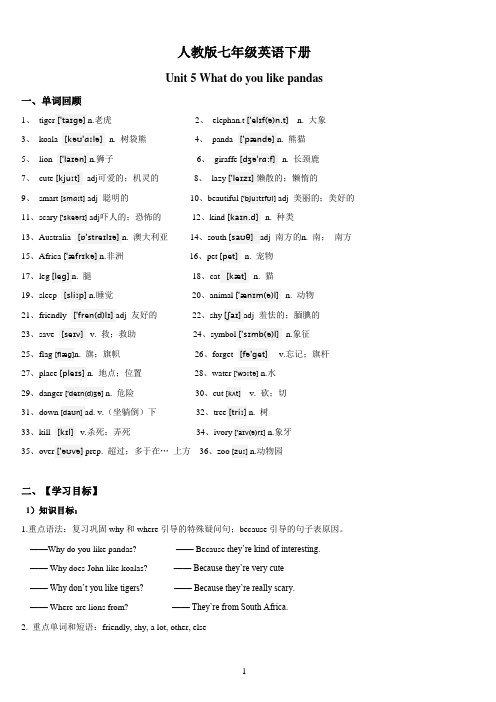
人教版七年级英语下册Unit 5 What do you like pandas一、单词回顾1、tiger['taɪgə] n.老虎2、elephan.t['elɪf(ə)n.t]n. 大象3、koala [kəʊ'ɑːlə]n. 树袋熊4、panda ['pændə] n. 熊猫5、lion ['laɪən] n.狮子6、giraffe [dʒə'rɑ:f]n. 长颈鹿7、cute [kjuːt]adj可爱的;机灵的8、lazy ['leɪzɪ]懒散的;懒惰的9、smart [smɑːt] adj 聪明的10、beautiful ['bjuːtɪfʊl] adj 美丽的;美好的11、scary ['skeərɪ] adj吓人的;恐怖的12、kind [kaɪn.d]n. 种类13、Australia [ɒ'streɪlɪə] n. 澳大利亚14、south [saʊθ]adj 南方的n. 南;南方15、Africa ['æfrɪkə]n.非洲16、pet [pet]n. 宠物17、leg [leg]n. 腿18、cat[kæt]n. 猫19、sleep [sliːp]n.睡觉20、animal ['ænɪm(ə)l]n. 动物21、friendly ['fren(d)lɪ]adj 友好的22、shy [ʃaɪ]adj 羞怯的;腼腆的23、save [seɪv]v. 救;救助24、symbol['sɪmb(ə)l]n.象征25、flag [flæg]n. 旗;旗帜26、forget [fə'get]v.忘记;旗杆27、place [pleɪs]n. 地点;位置28、water ['wɔːtə] n.水29、danger ['deɪn(d)ʒə] n. 危险30、cut [kʌt]v. 砍;切31、down [daʊn] ad. v.(坐躺倒)下32、tree[triː] n. 树33、kill [kɪl]v.杀死;弄死34、ivory ['aɪv(ə)rɪ] n.象牙35、over['əʊvə] prep. 超过;多于在…上方36、zoo [zuː] n.动物园二、【学习目标】1)知识目标:1.重点语法:复习巩固why和where引导的特殊疑问句;because引导的句子表原因。
人教版七年级英语下册第五单元知识点总结
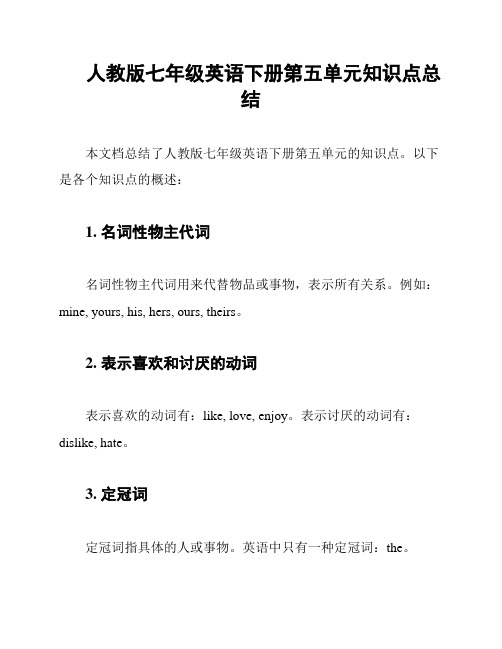
人教版七年级英语下册第五单元知识点总结本文档总结了人教版七年级英语下册第五单元的知识点。
以下是各个知识点的概述:1. 名词性物主代词名词性物主代词用来代替物品或事物,表示所有关系。
例如:mine, yours, his, hers, ours, theirs。
2. 表示喜欢和讨厌的动词表示喜欢的动词有:like, love, enjoy。
表示讨厌的动词有:dislike, hate。
3. 定冠词定冠词指具体的人或事物。
英语中只有一种定冠词:the。
4. 不可数名词的量的表达不可数名词是指不能单独计算的名词。
表示不可数名词的量通常使用some和any。
例如:some milk, any water。
5. 可数名词的复数形式可数名词表示单数和复数。
一般情况下,在名词末尾加-s表示复数。
例如:books, chairs。
6. 表示喜欢和讨厌的名词表示喜欢的名词有:like, love。
表示讨厌的名词有:dislike, hate。
7. too和enough的用法too用来表示“太……”,enough用来表示“足够的”。
例如:He is too young. The lesson is long enough.8. 一般过去时的用法一般过去时用于表示过去发生的动作或存在的状态。
动词的过去式通常在其词尾加-ed。
例如:I played soccer yesterday.9. 情态动词can的用法情态动词can表示能力或技能。
可以用来表示一种能力或能够做某事。
例如:He can swim.这些是人教版七年级英语下册第五单元的知识点总结。
希望对你有帮助!。
人教七年级下册英语U5知识点

人教七年级下册英语U5知识点Unit 5 My school day本单元介绍了日常学习生活中的一些常用句子及单词,本文将总结一些本单元的重点内容,以帮助学生们更好地掌握英语知识。
1.学校设施学校设施在日常生活中是常用的单词,如:library, laboratory, classroom等,还有playground,即操场。
学生们可以运用这些单词来描述自己的学校,如:Our school has a big library.或We usually play basketball on the playground after class.2.时间和动词时间和动词是英语语言中的重要部分。
在本单元中,有一些常用动词,如:get up, have breakfast/lunch/dinner, go to bed等。
学生们可以运用这些单词来描述自己的日常生活,如下:I usually get up at 6:30 in the morning.I have breakfast at 7 o'clock.I go to bed at 10 o'clock at night.3.日常活动在学习英语的过程中,日常活动也是常用语句。
在本单元中,有一些常用语句,如:It's time to..., I take..., I play..., I do..., 等。
学生们可以运用这些常用语句来叙述自己的日常生活,如下:It's time to go to school now.I take a bus to school every morning.I usually play basketball with my friends after school.I do my homework before dinner.4.一般现在时的动词变化一般现在时在英语语言中也是十分常见的。
人教版七年级下册英语Unit 5 --6知识点语法归纳总结
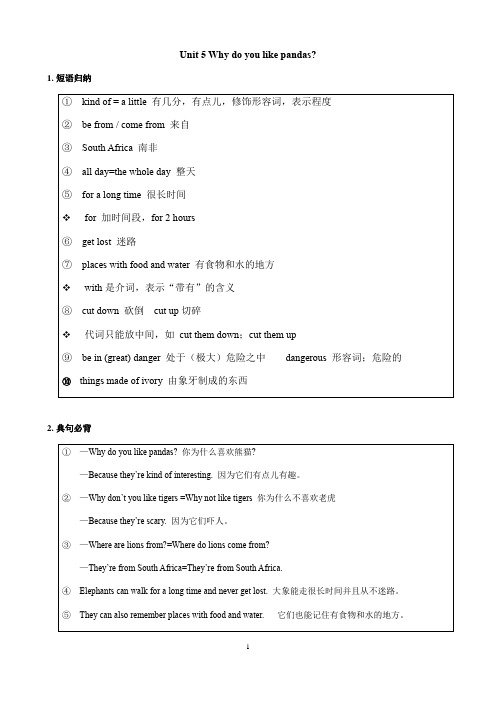
Unit 5 Why do you like pandas?1.短语归纳2.典句必背3.用法集萃(1)Well, because she’s kind of boring. 嗯,因为她有点儿无聊❖kind of意为“稍微;有点儿”,用来修饰形容词或副词,表示程度,和a bit, a little, a little bit意义相同。
例:The monkey is kind of cute. 那只猴子有点儿可爱❖含有kind的短语还有:牛刀小试There are many ______ animals in the zoo. Most of them are _______ cute.A.kind of; kind ofB.kinds of; kind ofC.kinds of; kinds ofD.kind of; kinds of(2)She sleeps all day, and her name is Lazy. 她整天睡觉,她的名字叫Lazy❖sleep可以作动词,也可以作名词,意为“睡觉”。
例:It’s time to sleep. 该睡觉了I sometimes have a sleep in the afternoon. 我有时下午睡觉❖派生词:sleepy adj.困乏的;想睡的asleep adj. 睡着的(fall asleep 入睡;睡着)牛刀小试Paul stayed up late to watch the soccer game last night and now he feels very_______ .A.sleep B . asleep C.sleepy(3)I don’t like cats because they’re lazy. 我不喜欢猫,因为它们很懒❖lazy作形容词,意为“懒散的;懒惰的”。
例:The boy is lazy and he never gets up early on weekends.❖反义词:hard-working adj. 勤奋的;勤勉的(4)People say that “an elephant never forgets”. 人们常说“大象从不忘记”❖辨析:forget to do sth.;forget doing sth.牛刀小试Don’t forget _____ your hands before you have dinner.A.to washB. washingC. washD. washes(5)Elephants can walk for a long time and never get lost. 大象能够长时间行走,而且从不迷路❖lost 作为形容词,意为“走失的,迷路的,失散的”或者“丢失的,遗失的”;常与系动词be或者get连用,表示“丢失,走失,迷路”。
人教版英语七年级下册第五单元短语语法知识点总结

Unit 5Why do you like pandas?【短语归纳】1.kind of 有几分,有点儿2. be from / come from 来自于3. South Africa 南非4.all day 整天5. for a long time 很长时间6. get lost 迷路7.places with food and water 有食物和水的地方8. cut down 砍倒9.in (great) danger 处于(极大)危险之中 10. twelve years old 十二岁11. thins made of ivory 由象牙制成的东西【用法集萃】1.—Why…? 为什么……?—Because…因为……2. let sb. do sth. 让某人做某事3.want to do sth. 想要做某事4. one of + 名词复数……之一5. forget to do sth. 忘记要做某事6. forget doing sth. 忘记做过某事7. help sb. (to) do sth. 帮助某人做某事 8. be friendly to sb. 对某人友好┃语法探究┃Ⅰ.why引导的特殊疑问句特殊疑问副词why 在句子中用来提问__________ 。
结构: Why + do(n't)/does(n't) +主语+其他?回答: Why 引起的特殊疑问句只能用because来回答。
如:—Why do you like monkeys? 你为什么喜欢猴子?—Because they are very clever.因为它们很聪明。
Ⅱ. where 引导的特殊疑问句特殊疑问副词where 在句子中用来提问__________。
结构: Where + be +主语+其他?Where + do/does +主语+动词原形+其他?如:—Where are you from? 你来自哪里?—I am from Shandong. 我来自山东。
(完整版)人教版七年级英语下册第五单元知识点总结

人教版七年级下册英语第五单元Unit5 Why do you like pandas? 知识要点重要短语like…a lot 非常喜欢… black and white 黑白相间 all day整天Let’s do= let us do 让我们做……kind of 有点儿,稍微 South Africa南非be from/come from 来自于save the elephants救助大象one of…其中之一a symbol of good luck好运的象征 get lost迷路 cut down 砍倒for a long time 很长时间in great danger处于(极大)危险之中things be made of ivory由象牙制成的东西 places with food and water有食物和水的地方kill……for……为……杀1.see the pandas 看熊猫2.my favorite animals我最喜欢的动物3.welcome to sp 欢迎来某地4.welcome back to sp 欢迎回到某地5.be from 来自e from来自7.in the zoo 在动物园里8.on the farm 在农场里9.my new pet 我的新宠物10.walk on two legs 用两条腿走11.kind of有点12.kind of interesting有点有趣13.a little有点14.a little boring有点无聊15.a kind of一种16.all kinds of 各种各样的17.all day整天18.a good name for sb对某人是一个好名字19.South Africa南非20.South China华南21.South America南美洲22.America, the USA美国23.the UK ,England英国24.the South Pole南极25.what animals什么动物26.save the elephants挽救大象27.one of +n复数。
人教七年级下unit5知识点

人教七年级下unit5知识点在人教七年级下unit5课程中,我们学习了关于“食物和饮料”这一主题的知识点。
以下是本单元主要的知识点:一、单词和短语1. 食物:fruit, vegetables, chicken, fish, bread, rice, noodles, milk, cheese, cake 等。
2. 饮料:water, juice, tea, coffee, cola, lemonade 等。
3. 特殊饮食需求:vegetarian(素食主义者), vegan(纯素食主义者)等。
4. 食物和饮料的数量:a glass of milk, a cup of tea, a bottle of water, a loaf of bread 等。
二、语法1. 倒装句:在英语中,为了强调某些语句内容,常使用倒装句。
例如:Never have I seen such a beautiful sunset.(我从未看过如此美丽的日落。
)2. 疑问句类型:在英语中,疑问句有两种类型,一种是一般疑问句,以助动词开头,另一种是特殊疑问句,以特殊疑问词开头。
例如:Do you like apples?(你喜欢苹果吗?)What kind of food do you like?(你喜欢什么食物?)三、口语表达1. 询问对方喜欢什么食物、饮料等:What kind of food/drink do you like?2. 询问对方是否饱了:Are you full?3. 表达自己的饮食要求:I am a vegetarian.4. 发表自己对食品的看法:I love pizza. It's delicious.以上就是本单元的主要知识点,希望同学们能够通过学习,掌握这些基础的英语单词和语法知识,为今后更高层次的英语学习打下坚实的基础。
- 1、下载文档前请自行甄别文档内容的完整性,平台不提供额外的编辑、内容补充、找答案等附加服务。
- 2、"仅部分预览"的文档,不可在线预览部分如存在完整性等问题,可反馈申请退款(可完整预览的文档不适用该条件!)。
- 3、如文档侵犯您的权益,请联系客服反馈,我们会尽快为您处理(人工客服工作时间:9:00-18:30)。
完整版)人教版七年级英语下册第五单元知识点总结Unit 5 Why Do You Like Pandas。
Knowledge PointsImportant Phrases:Like。
a lot: Really enjoyBlack and white: The colors black and whiteAll day: The entire dayLet's do: Allow us to doKind of: A little bit。
XXXSouth Africa: A country in southern AfricaCome from/be from: Originating fromSave the elephants: XXX harmOne of: One of manyA symbol of good luck: A XXXGet lost: XXXCut down: To chop downFor a long time: A lengthy d of timeIn great danger: XXX dangerXXX ivory: XXXPlaces with food and water: XXX sustenanceKill。
for: To take the life of an animal for a specific purpose1.Seeing Pandas: Observing pandas2.My Favorite Animals: XXX XXX3.e to SP: Greetings to SP4.e Back to SP: Greetings to SP upon returning5.From: Originating from6.In the Zoo: Located in a zoo7.On the Farm: Located on a farm8.My New Pet: XXX9.XXX: Bipedal movement10.Kind of: XXX11.Kind of Interesting: XXX12.A XXX: XXX13.A Little Boring: XXX14.A Kind of: A type of15.All Kinds of: Many different types of16.All Day: The entire day17.A Good Name for XXX: A fitting name for a person18.South Africa: A country in southern Africa19.South China: The southern n of China20.South America: The southern n of the Americas21.America。
the USA: The United States of America22.XXX UK。
England: The United Kingdom of Great Britain and Northern Ireland23.The South Pole: The southernmost point on Earth24.What Animals: Which animals25.Save XXX: XXX harm26.One of: One of many27.The First Lesson: Lesson One28.Clever: Intelligent and quick-witted29.Cute: Adorable and charming.Smart refers to XXX quick-witted。
but can also be mischievous。
XXX。
but with a n of being sharp and quick-thinking.An ugly face is a face that is not XXX.XXX.Being friendly with someone means having a good XXX.XXX.XXX them well and with kindness.The other people refers to those who are not included in a specific group or category.XXX discussed.Three other men means three nal men XXX.Another three men also means three nal men.Three more men means three nal men.XXX that is different or nal。
and is used after XXX.Other refers to something or someone that is different or nal。
and is used before a noun.XXX ground.To go to sleep means to fall asleep or to get ready for bed.To go to bed means to get into bed and sleep.Every day means each day。
on a daily basis.XXX.A symbol of good luck is something that is XXX.To et to do something means to XXX do it.XXX doing something means to not remember that it was done.To walk for a long time means to travel by foot for an extended d.To be or get lost means to not know where you are or how to get to your n.Places with food and water are XXX.To be in (great) danger means to be at risk of harm or injury.To cut down means to chop or fell something。
such as a tree.XXX.To cut off means to XXX.To kill。
for。
means to take the life of something or XXX.To be made of means to be XXX substance.XXX XXX。
XXX.Why don't you do something?" is a XXX is not doing a particular n.Why not do something?" is a n to do something that is being proposed.Let's do something" is an XXX.Shall we do something?" is a XXX.What about trying something new。
尝试一些新的事情怎样?Because they are adorable。
因为它们太可爱了。
How do you feel about doing something different。
对于尝试不同的事情,你感觉怎样?Where do they originate from。
它们的原产地在哪里?What type of animals do you have an affinity for。
你喜欢哪种类型的动物?XXX China。
它们来自中国。
I have a fondness for XXX。
我喜欢熊猫。
What is it about pandas that you like。
你为什么喜欢熊猫?Why do you want to see them。
你为什么想要看它们?XXX。
我喜欢考拉因为它们很聪明。
I am not a fan of tigers because they are quite frightening。
我不喜欢老虎因为它们太吓人了。
Grammar Points:1.Imperative sentences are used to express requests。
commands。
advice。
XXX.Characteristics: 1) The subject of the XXX the second person。
but it is often omitted.2) Generally。
there are no interrogative sentences。
only affirmative and negative forms.Structure: 1) be + adjective/noun: Be quiet。
Be a good student!Affirmative form: 2) Starting with a real verb: Come in。
please!3) Let type: Let me help you.Negative form: 1) be type: Don't be careless!2) do type: Don't believe him!3) let type: Let + object + not + verb XXX: Let's not think about it.Don't + let + object + verb XXX: Don't let Jim do that.In public places。
negative XXX are often used with "No + noun/V-ing form" to indicate "n".No photos。
No parking!3.The difference een family。
home。
and house:Family XXX to the whole "家庭" as a subject and is treated as XXX。
